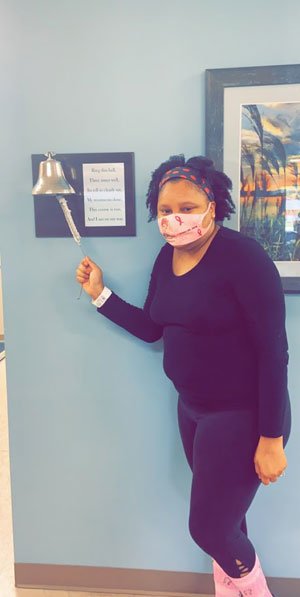Connect with a Cancer Expert
Our cancer team is here for you in-person, by phone and virtually for all your cancer care needs.
 In June 2019, she felt a hard, movable lump in her breast. Her primary care physician ordered diagnostic imaging and after a biopsy, he referred her to the breast cancer team at Henry Ford Cancer Institute.
In June 2019, she felt a hard, movable lump in her breast. Her primary care physician ordered diagnostic imaging and after a biopsy, he referred her to the breast cancer team at Henry Ford Cancer Institute.
As a foster care caseworker, Dorthilen was accustomed to making important decisions and recommendations to judges. Similarly, Dorthilen knew she needed time to process information.
“I wanted to wait and cry,” says Dorthilen, a married mother with a three-year-old daughter. “But my mom said, ‘You don’t have time for a pity party. Waiting comes with consequences.’”
At Henry Ford, her breast cancer team quickly coordinated a treatment plan. Her nurse navigator scheduled all her appointments, including a meeting with a fertility preservation specialist to freeze Dorthilen’s eggs so she could have a baby in the future.
After a preliminary urine test, the fertility expert said, “We can’t freeze your eggs. You’re already pregnant.”
 “What?!!,” Dorthilen recalls. Turning to her husband who had been talking with their daughter, she asked him, “Did you hear that?! Oh my gosh, she says I’m pregnant!”
“What?!!,” Dorthilen recalls. Turning to her husband who had been talking with their daughter, she asked him, “Did you hear that?! Oh my gosh, she says I’m pregnant!”
“We were so shocked, we couldn’t believe it,” says Dorthilen.
The pregnancy required a quick course correction for her treatment plan, says breast cancer surgeon Jessica Bensenhaver, M.D.
“Because the tumor was large and because she was pregnant — during which time patients can’t receive radiation — a lumpectomy was not an option,” says Dr. Bensenhaver. “Normally, chemotherapy can melt this type of tumor, but tumor-shrinking chemotherapy is not recommended in the first trimester of pregnancy. Surgery was the only option to initiate treatment, so we first performed a mastectomy."
Although the cancer had been rapidly growing, surgery revealed the disease had not spread into the lymph nodes that had been checked during the mastectomy.
Dr. Bensenhaver and the team were great, Dorthilen says. “We had a connection and personal interaction. She was very concerned, and she made me feel comfortable.”
Chemotherapy was next. “You don’t know what you’d do unless you’re in that situation,” says Dorthilen, who was the first person in her family identified with the BRCA gene. “I knew I would have to raise two kids. But I felt safer waiting until the baby was fully formed in the second trimester.”

Our cancer team is here for you in-person, by phone and virtually for all your cancer care needs.
At Henry Ford’s chemotherapy class, nurses advised Dorthilen about the side effects and offered a cool cap to save her hair. With the cool cap worn during chemotherapy, there was a 20 percent chance she would keep hair.
 “As an African American woman, I have thicker hair and hoped that would help prevent hair loss,” says Dorthilen. She kept her hair.
“As an African American woman, I have thicker hair and hoped that would help prevent hair loss,” says Dorthilen. She kept her hair.
But some days fatigue overwhelmed her. “It would take an hour to make a bowl of cereal,” says Dorthilen.
To assist the family at Christmastime, a Henry Ford social worker arranged to help Dorthilen’s family with utility bills and gifts. Additionally, the out-of-pocket costs for Dorthilen’s cool cap was reduced to $300.
In spring 2020, Dorthilen gave birth to a healthy, “miracle baby.” “He’s wonderful,” she says. One month later, she began another round of chemotherapy for twelve weeks.
“My husband Johnny has shown me what true love means. You expect illness when you’re older, but this happened in our twenties,” says Dorthilen. “He has had to help me shower and go to the bathroom. I’m so grateful to have him. He makes me feel beautiful.”
Dorthilen and her husband are a team at home and on the basketball court. Together they’ve coached basketball at Melvindale High School and Strong Middle School.
“I’ve had my family to help and motivate me,” says Dorthilen. “My mom is my superhero and best friend.” Her mother relocated from Missouri to Michigan two weeks after the diagnosis.
“I’m a strong believer in God. Sometimes I’d have to go and pray and cry,” she says. “After that, I’d choose to be happy.”
Dorthilen was in a very difficult situation, and she faced it with complete strength, says Dr. Bensenhaver.
 “I used to act like I was invincible,” says Dorthilen. “But cancer can get anyone — your age or race doesn’t matter. Go to the doctor, pay attention and ask questions. Get a mammogram.”
“I used to act like I was invincible,” says Dorthilen. “But cancer can get anyone — your age or race doesn’t matter. Go to the doctor, pay attention and ask questions. Get a mammogram.”
Because carrying a BRCA gene mutation means Dorthilen is at a high risk for getting a second new breast cancer and ovarian cancer, she may have another mastectomy and her ovaries may be removed. Also, breast reconstruction will be done.
Dorthilen’s goals: Start a home for homeless girls or teenaged victims of domestic violence, and help her husband achieve his goal to work with youths. “We can work even harder now to make all our dreams come true,” she says.
We use cookies to improve your website experience. By using this site, you agree to our Terms of Use. Read our Internet Privacy Statement to learn what information we collect and how we use it.